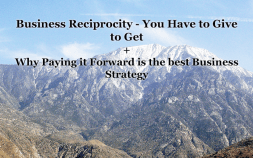Yahoo has agreed to purchase Tumblr for 1.1 billion dollars. (that’s billions, with a capital B!) Right now you’re probably asking, “what does this have to do with my business?” A lot more than you’d expect, actually.
Tumblr is a free website and blogging service that anyone can use to create a quick & easy blog for their business without having to write any code or have any design knowledge. The beauty of the platform is it’s simplicity. Many small (and larger) businesses have used it very successfully to grow their business in a short amount of time. But here’s the problem. By hitching their wagon to a platform that they don’t own or control, these businesses could very well be out of business in the not-so-distant future if Yahoo decides to change Tumblr’s functionality, terms of service, or any number of other things (as they have done in the past with previous acquisitions).
This is why it’s so important to own your marketing platform. If you’re building your digital marketing presence on someone else’s real estate, whether it’s Facebook, Twitter, YouTube, LinkedIn, Tumblr, MySpace, Pinterest, Instagram, Google+, or any other online channel, you’re effectively digital sharecropping, and that is a very bad thing to do.
As I’m constantly telling our consulting and website clients, you have to “own your platform.” That means the information you create and distribute must originate from your website that you own and control. It’s fine to use social media and other free services as a distribution channel, but you can’t rely on them as your primary platform.
The rentor is always subject to the landlord. I’m sure you’re well aware of this principle, especially if you rent your office space. If the owner of your building decides he wants to tear it down and build apartments on the land instead, once your lease is up, he can do just that, because he owns the real estate, and you have no recourse. The same principle is true with your digital real estate. It’s better to own than rent. Otherwise, you’re at the mercy of your digital landlord.
This is why I recommend building your website using WordPress, on your own hosting account. You own it. You control it. It can’t be ripped out from under you if the landlord (company who owns the platform) changes the rules.
As a blogger, your website is your single most valuable asset. It’s not just the platform to spread your message, it’s your online home. It’s where the magic happens. All of your content, whether written blog posts, tutorials, audio podcasts, videos, pictures and infographics, etc. should all originate from your site. And in order to best protect all this valuable content, you’ve got to own your platform.
You’re probably wondering what I mean by “own your platform”, right? What I mean is that you can’t be a “Digital Sharecropper”. Even more confused? I’ll explain.
Digital sharecropping is when you place your eggs into someone else’s basket. When you build your virtual house (your website) on land that you don’t own. A perfect example of this is if your blog is built on Blogger.com, WordPress.com, SquareSpace, Tumblr, Wix, Weebly, etc. You don’t own those platforms. If Blogger, Tumblr or any of the others mentioned above decide you violated their terms of service, or change their TOS without your knowledge, they can (and will) delete your account and all your amazing content and hard work that went into creating it. And you have no legal recourse or recompense. Scary, eh?
So what should you do? You need to own your domain name, hosting account, and blogging software that powers your website.
You MUST own your own domain name. This is a non-negotiable. Since you’re reading this, you probably already do. And if not, go over to Hover and buy it (and variations of it) right now!
Second, you need a GOOD hosting account. And I don’t mean a cheap shared GoDaddy or HostGator account either. You need a solid, managed WordPress hosting provider (assuming you’re using the WordPress platform for your blog) such as Synthesis or SiteGround. When it comes to hosting, not all are created equal.
There is a HUGE difference in quality between cheap, shared hosting, and these premium managed providers. Yes, they are more expensive, but when it comes to hosting, you DEFINITELY get what you pay for. Shared hosting providers will shut down your account if your post goes viral on Pinterest and you go over their allowed bandwidth allowance. Managed WordPress hosts will let you know it’s time to upgrade, but they won’t turn off your site. Hosting is the foundation of your website. Better to do it right the first time and pay a little more than have to move hosts multiple times, deal with downtime, and have to pay someone each time your site needs moved or upgraded.
Thirdly, you need WordPress. If you’ve been blogging for any length of time I’m sure you’ve at least heard of it and are probably using it. WordPress powers almost 20% of every website online, and is growing by leaps and bounds. Just so you know, there is a difference between WordPress.com and WordPress.org. WordPress.com is a *free, hosted blogging platform. I put an asterisk next to free because you’re VERY limited in what you can customize and change unless you upgrade to a paid plan. Connecting your own domain name will cost you. The advantage of WordPress.com is that you don’t have to worry about hosting, coding, etc. You can just write. The downside is that once again, you aren’t in control of your site, WordPress.com is.
WordPress.org on the other hand is free, open source software that anyone can download, edit, and change, however you see fit. You must have your own hosting account to use it, so there is more work involved, but the sky is the limit when it comes to customization and changes. You’re only limited by your ability to learn to use and customize it, or the cost required to hire someone to do the same for you. It’s also the most search engine friendly out of the box, and by adding a couple of helpful plugins, can become even better.
These are the three most important things you can do to ensure the long-term success and stability of your site. In an upcoming tutorial, we’ll be covering some of the most important things you can do to optimize your WordPress site for search engine traffic, and user experience.
Are you digital sharecropping or do you own your platform?


